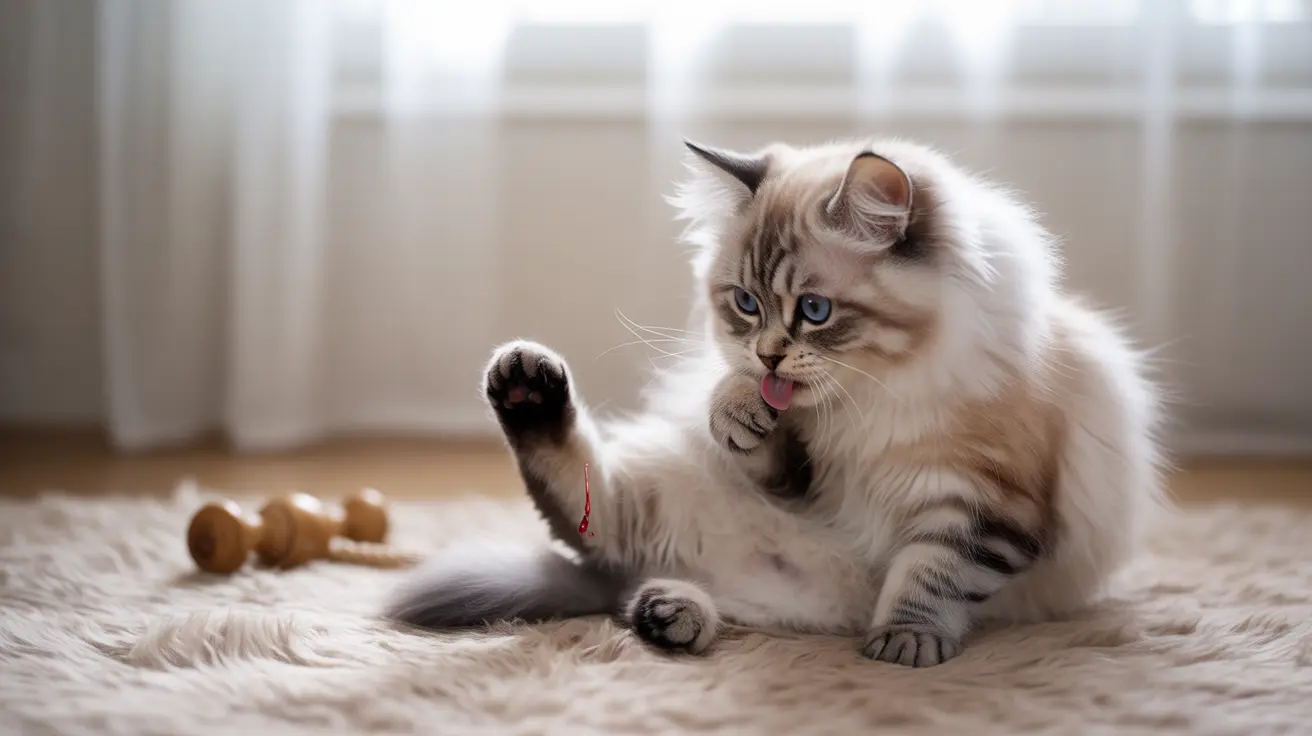When you notice your cat bleeding from the anus, it's natural to feel concerned. This alarming symptom can indicate various health issues, ranging from minor irritations to serious medical conditions. Understanding the potential causes and knowing when to seek veterinary care is crucial for your cat's well-being.
In this comprehensive guide, we'll explore the common causes of anal bleeding in cats, associated symptoms, and appropriate treatment options. We'll also help you recognize when immediate veterinary attention is necessary.
Common Causes of Anal Bleeding in Cats
Anal Sac Disease
One of the most frequent causes of anal bleeding in cats is anal sac disease. These small glands located on either side of the anus can become impacted, infected, or abscessed. When this occurs, you might notice bloody discharge, excessive licking of the area, or your cat scooting across the floor.
Trauma and Injuries
Physical injuries from fights, accidents, or ingested foreign objects can cause rectal bleeding. Outdoor cats are particularly susceptible to these types of injuries. Sharp objects passing through the digestive tract can also cause internal damage and bleeding.
Serious Medical Conditions
Intestinal Parasites
Parasitic infections, particularly in kittens and young cats, can lead to rectal bleeding. Common culprits include hookworms, roundworms, and protozoan parasites like Giardia. These parasites often cause additional symptoms such as diarrhea and weight loss.
Inflammatory Conditions
Conditions like inflammatory bowel disease (IBD), colitis, and proctitis can cause bleeding from the anus. These conditions typically require long-term management and may need dietary modifications and medication.
Warning Signs and Symptoms
Beyond visible bleeding, watch for these associated symptoms:
- Straining during defecation
- Changes in stool consistency
- Excessive grooming of the anal area
- Lethargy or decreased appetite
- Visible swelling or inflammation around the anus
When to Seek Emergency Care
Some situations require immediate veterinary attention:
- Profuse or continuous bleeding
- Signs of severe pain or distress
- Prolapsed tissue from the anus
- Accompanying symptoms like vomiting or collapse
- Suspected exposure to toxins or foreign objects
Prevention and Home Care
While not all causes of anal bleeding are preventable, these steps can help reduce risks:
- Regular veterinary check-ups
- Maintaining a consistent, high-quality diet
- Regular parasite prevention
- Keeping your cat's environment safe from hazards
- Monitoring litter box habits
Frequently Asked Questions
What are the most common causes of bleeding from a cat's anus?
The most common causes include anal sac disease, parasitic infections, injuries, inflammatory conditions, and in some cases, tumors or polyps. Each cause typically presents with additional distinctive symptoms that help determine the underlying issue.
How can I tell if my cat's anal bleeding is due to anal sac disease or another problem?
Anal sac disease typically presents with a foul odor, excessive licking of the area, and scooting behavior. However, a veterinary examination is necessary for accurate diagnosis, as these symptoms can overlap with other conditions.
When should I seek emergency veterinary care for my cat bleeding from the anus?
Seek immediate care if the bleeding is profuse, continuous, or accompanied by lethargy, pain, vomiting, or collapse. Also seek emergency care if you notice tissue protruding from the anus or suspect your cat has ingested something harmful.
How is rectal prolapse treated in cats and what are the warning signs?
Rectal prolapse requires immediate veterinary intervention. Warning signs include visible tissue protruding from the anus, straining to defecate, and bloody discharge. Treatment typically involves careful tissue replacement and sometimes surgery to prevent recurrence.
What home care steps can help prevent or manage my cat's anal bleeding issues?
Preventive measures include maintaining good hygiene, regular veterinary check-ups, proper diet, and parasite prevention. However, active bleeding should always be evaluated by a veterinarian before attempting any home care measures.
Conclusion
While anal bleeding in cats can be alarming, understanding the potential causes and knowing when to seek veterinary care can help ensure the best outcome for your pet. Never hesitate to contact your veterinarian if you notice this symptom, as early intervention often leads to better treatment results.






